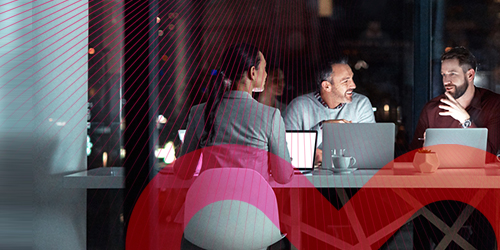Check Point® Software Technologies Ltd. (NASDAQ: CHKP), a leading provider of cybersecurity solutions globally, has today released the findings of a new survey showing how organizations managed their cyber-security during the lockdowns forced by the Covid-19 pandemic, and also listing their security priorities and concerns over the coming months as they move to the ‘new normal.’
Over 86% of respondents said their biggest IT challenge during the pandemic was moving to mass remote working, and their biggest security concern was maintaining VPN capacity for staff. Key findings from the survey of over 270 IT and security professionals globally are:
- Top security concerns at the start of Covid-19 lockdowns: 62% of respondents said their main concern during initial lockdowns was maintaining secure remote access and VPN capacity for staff, followed by preventing social engineering attacks (47%), and securing staff endpoints and home networks (52%).
- The ‘new normal’ begins as offices start to re-open: 75% of respondents said their offices were open again for limited numbers of employees as lockdowns lift. But on average, staff are still working 4 days out of 5 at home – meaning remote-working vulnerabilities and threats will persist for a long time.
- The remote-working security gap: While 65% of respondents said their company blocks unmanaged PCs from corporate VPNs, just 29% deploy endpoint security on employees’ home PCs, and only 35% run compliance checks. 42% say their company invests in cyber-security training. This highlights how exposed organizations are to fast-moving, 5th generation cyber-attacks that target remote workers.
- The security priorities for the ‘new normal’ over the coming months: 79% of respondents said their main priority is tightening security and preventing attacks as employees continue to work flexibly from home. 43% stated they plan to implement mobile security solutions, and 39% plan to consolidate their security estates to help eliminate ‘blind spots’ across their enlarged network perimeters.
- Companies’ leading cyber-security concerns for the next 12 months: Over 75% of respondents said their biggest concern was an increase in cyber-attacks, especially phishing and social engineering exploits. 51% said that attacks on unmanaged home endpoints was a concern, followed by attacks against employee mobile devices (33%).
“Organizations had to restructure their network and security fabrics almost overnight to respond to the Covid-19 pandemic, and doing this inevitably meant that security gaps opened up, increasing their attack surface and creating new opportunities for criminals,” said Moti Sagey, Chief Evangelist at Check Point Software Technologies. “Now that we are moving towards a ‘new normal’ way of working as lockdowns lift globally, organizations need to close off those security gaps and secure their networks, from employees’ home PCs and mobiles to the enterprise data center, with a holistic, end-to-end security architecture. The Covid-19 pandemic may be fading, but the cyber-crime pandemic it triggered is here to stay. However with the right approach to security, we can prevent attacks from causing widespread damage and disruption.”
In April, a survey by Check Point showed that organizations were being hit by a ‘perfect storm’ of increased cyber-attacks, while having to manage the massive and rapid changes to their networks and employee working practices during the pandemic. 71% of respondents reported an increase in cyber-attacks during February and March 2020, and 95% said they faced added IT security challenges with provision of large-scale remote access for employees, as well as managing shadow IT usage.
Check Point has a full range of security solutions that ensure best-in-class connectivity and security for remote working, allowing workforces to remain as productive as possible. These include Check Point’s Remote Access VPN Software, Endpoint Threat Prevention, Mobile Security and Mobile Secure Workspace all aim to take a practical approach towards securing remote workers. Check Point’s SandBlast Agent delivers complete endpoint threat prevention against zero-day attacks delivering a 100% block rate even for unknown threats with zero false positives.
The survey was conducted by Check Point with 271 respondents from enterprise organizations globally. For more details on the survey visit: /cybersecurity-the-new-normal/
For full details of Check Point’s solutions for securing remote workforces, visit /solutions/secure-remote-workforce-during-coronavirus/
Follow Check Point via:
Twitter: https://www.twitter.com/checkpointsw
Facebook: https://www.facebook.com/checkpointsoftware
Blog: https://blog.checkpoint.com
YouTube: https://www.youtube.com/user/CPGlobal
LinkedIn: https://www.linkedin.com/company/check-point-software-technologies
About Check Point Software Technologies Ltd.
Check Point Software Technologies Ltd. (www.checkpoint.com) is a leading provider of cyber security solutions to governments and corporate enterprises globally. Its solutions protect customers from 5th generation cyber-attacks with an industry leading catch rate of malware, ransomware and other types of attacks. Check Point offers its multilevel security architecture, Infinity Total Protection with Gen V advanced threat prevention, which defends enterprises’ cloud, network and mobile device held information. Check Point provides the most comprehensive and intuitive one point of control security management system. Check Point protects over 100,000 organizations of all sizes.





